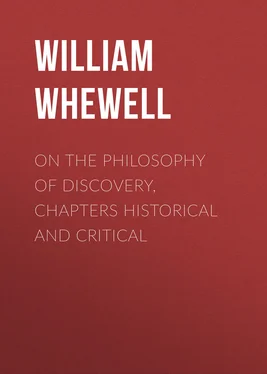William Whewell - On the Philosophy of Discovery, Chapters Historical and Critical
Здесь есть возможность читать онлайн «William Whewell - On the Philosophy of Discovery, Chapters Historical and Critical» — ознакомительный отрывок электронной книги совершенно бесплатно, а после прочтения отрывка купить полную версию. В некоторых случаях можно слушать аудио, скачать через торрент в формате fb2 и присутствует краткое содержание. Жанр: foreign_prose, foreign_religion, Философия, foreign_psychology, foreign_antique, на английском языке. Описание произведения, (предисловие) а так же отзывы посетителей доступны на портале библиотеки ЛибКат.
- Название:On the Philosophy of Discovery, Chapters Historical and Critical
- Автор:
- Жанр:
- Год:неизвестен
- ISBN:нет данных
- Рейтинг книги:5 / 5. Голосов: 1
-
Избранное:Добавить в избранное
- Отзывы:
-
Ваша оценка:
- 100
- 1
- 2
- 3
- 4
- 5
On the Philosophy of Discovery, Chapters Historical and Critical: краткое содержание, описание и аннотация
Предлагаем к чтению аннотацию, описание, краткое содержание или предисловие (зависит от того, что написал сам автор книги «On the Philosophy of Discovery, Chapters Historical and Critical»). Если вы не нашли необходимую информацию о книге — напишите в комментариях, мы постараемся отыскать её.
On the Philosophy of Discovery, Chapters Historical and Critical — читать онлайн ознакомительный отрывок
Ниже представлен текст книги, разбитый по страницам. Система сохранения места последней прочитанной страницы, позволяет с удобством читать онлайн бесплатно книгу «On the Philosophy of Discovery, Chapters Historical and Critical», без необходимости каждый раз заново искать на чём Вы остановились. Поставьте закладку, и сможете в любой момент перейти на страницу, на которой закончили чтение.
Интервал:
Закладка:
Yet Aristotle was so far consistent with his own doctrine of the derivation of knowledge from experience, that he made in almost every province of human knowledge, a vast collection of such special facts as the experience of his time supplied. These collections are almost unrivalled, even to the present day, especially in Natural History; in other departments, when to the facts we must add the right Inductive Idea, in order to obtain truth, we find little of value in the Aristotelic works. But in those parts which refer to Natural History, we find not only an immense and varied collection of facts and observations, but a sagacity and acuteness in classification which it is impossible not to admire. This indeed appears to have been the most eminent faculty in Aristotle's mind.
The influence of Aristotle in succeeding ages will come under our notice shortly.
CHAPTER V.
Additional Remarks on Aristotle
1. ONE of the most conspicuous points in Aristotle's doctrines as bearing upon the philosophy of Science is his account of that mode of attaining truth which is called Induction ; for we are accustomed to consider Induction as the process by which our Sciences have been formed; and we call them collectively the Inductive Sciences . Aristotle often speaks of Induction, as for instance, when he says that Socrates introduced the frequent use of it. But the cardinal passage on this subject is in his Analytics , in which he compares Syllogism and Induction as two modes of drawing conclusions 20 20 Analyt. Prior. ii. 25.
. He there says that all belief arises either from Syllogism or from Induction: and adds that Induction is, when by means of one extreme term we infer the other extreme to be true of the middle term. The example which he gives is this: knowing that particular animals are long-lived, as elephant, horse, mule; and finding that these animals agree in having no gall-bladder; we infer, by Induction , that all animals which have no gall-bladder are long-lived. This may be done, he says, if the middle and the second extreme are convertible: as the following formal statement may show.
Elephant, horse, mule, &c. are long-lived.
Elephant, horse, mule, &c. are all gall-less.
If we might convert this proposition, and say
All gall-less animals are as elephant, horse, mule, &c.:
we might infer syllogistically that
All gall-less animals are long-lived.
And though we cannot infer this syllogistically, we infer it by Induction, when we have a sufficient amount of instances 21 21 See on this subject Appendix, Essay D.
.
I have already elsewhere given this account of Induction, as a process employed in the formation of our knowledge 22 22 See the chapter on Certain Characteristics of Scientific Induction in the Phil. Ind. Sc. or in the Nov. Org. Renov.
. What I have now to remark concerning Aristotle is, that it does not appear to have occurred to him, that in establishing such a proposition as that which he gives as his instance, the main difficulty is the discovery of a middle term which will allow us to frame such a proposition as we need. The zoologist who wanted to know what kind of animals are long-lived, might guess long before he guessed that the absence of the gall-bladder supplied the requisite middle term; (if the proposition were true; which it is not.) And in like manner in other cases, it is difficult to find a middle term, which enables us to collect a proposition by Induction. And herein consists the imperfection of his view of the subject; which considers the main point to be the proof of the proposition when the conceptions are given , whereas the main point really is, the discovery of conceptions which will make a true proposition possible.
2. Since the main characteristic of the steps which have occurred in the formation of the physical sciences, is not merely that they are propositions collected by Induction, but by the introduction of a new conception; it has been suggested that it is not a characteristic designation of these Sciences to call them Inductive Sciences . Almost every discovery involves in it the introduction of a new conception, as the element of a new proposition; and the novelty of the conception is more characteristic of the stages of discovery than the inductive application of it. Hence as bearing upon the Philosophy of Discovery, the statements of Aristotle concerning Induction, though acute and valuable, are not so valuable as they might seem. Even Francis Bacon, it has been asserted, erred in the same way (and of course with less excuse) in asserting Induction, of a certain kind, to be the great instrument for the promotion of knowledge, and in overlooking the necessity of the Invention which gives Induction its value.
3. The invention or discovery of a conception by which many facts of observation are conjoined so as to make them the materials of a proposition, is called in Plato, as we have seen, finding the One in the Many .
In the passage quoted from the Later Analytics , Aristotle uses the same expression, and speaks very justly respecting the formation of knowledge. Indeed the Titles of the chapters of this and many parts of Aristotle's works would lead us to expect just such a Philosophy of Discovery as is the object of our study at present. Thus we have, Anal. Post. B. II. chap. 13: "How we are to hunt (θηρεύειν) the predications of a Definition." Chap. 14: "Precepts for the invention of Problems and of a Middle Term:" and the like. But when we come to read these chapters, they contain little that is of value, and resolve themselves mostly into permutations of Aristotle's logical phraseology.
4. The part of the Aristotelian philosophy which has most permanently retained its place in modern Sciences is a part of which a use has been made quite different from that which was originally contemplated. The "Five words" which are explained in the Introduction to Aristotle's Categories : namely, the words Genus , Species , Difference , Property , Accident , were introduced mainly that they might be used in the propositions of which Syllogisms consist, and might thus be the elements of reasoning. But it has so happened that these words are rarely used in Sciences of Reasoning, but are abundantly and commonly used in the Sciences of Classification, as I have explained in speaking of the Classificatory Sciences 23 23 Phil. Ind. Sc. b. viii. c. i. art. 11, or Hist. Sc. Id. b. viii.
.
5. Of Aristotle's actual contributions to the Physical Sciences I have spoken in the History of those Sciences 24 24 B. i. c. xi. sect. 2.
. I have 25 25 B. iii. c. i. sect. 9.
stated that he conceived the globular form of the earth so clearly and gave so forcibly the arguments for that doctrine, that we may look upon him as the most effective teacher of it. Also in the Appendix to that History, published in the third edition, I have given Aristotle's account of the Rainbow, as a further example of his industrious accumulation of facts, and of his liability to error in his facts.
6. We do not find Aristotle so much impressed as we might have expected by that great monument of Grecian ingenuity, the theory of epicycles and excentrics which his predecessor Plato urged so strongly upon the attention of his contemporaries. Aristotle proves, as I have said, the globular form of the earth by good and sufficient arguments. He also proves by arguments which seem to him quite conclusive 26 26 De Cælo , ii. 13.
, that the earth is in the center of the universe, and immoveable. As to the motions of the rest of the planets, he says little. The questions of their order, and their distances, and the like, belong, he says, to Astrology 27 27 Ibid. ii. 10.
. He remarks only that the revolution of the heaven itself, the outermost revolution, is simple and the quickest of all: that the revolutions of the others are slower, each moving in a direction opposite to the heaven in its own circle: and that it is reasonable that those which are nearest to the first revolution should take the longest time in describing their own circle, and those that are furthest off, the least time, and the intermediate ones in the order of their distances, "as also the mathematicians show."
Интервал:
Закладка:
Похожие книги на «On the Philosophy of Discovery, Chapters Historical and Critical»
Представляем Вашему вниманию похожие книги на «On the Philosophy of Discovery, Chapters Historical and Critical» списком для выбора. Мы отобрали схожую по названию и смыслу литературу в надежде предоставить читателям больше вариантов отыскать новые, интересные, ещё непрочитанные произведения.
Обсуждение, отзывы о книге «On the Philosophy of Discovery, Chapters Historical and Critical» и просто собственные мнения читателей. Оставьте ваши комментарии, напишите, что Вы думаете о произведении, его смысле или главных героях. Укажите что конкретно понравилось, а что нет, и почему Вы так считаете.












